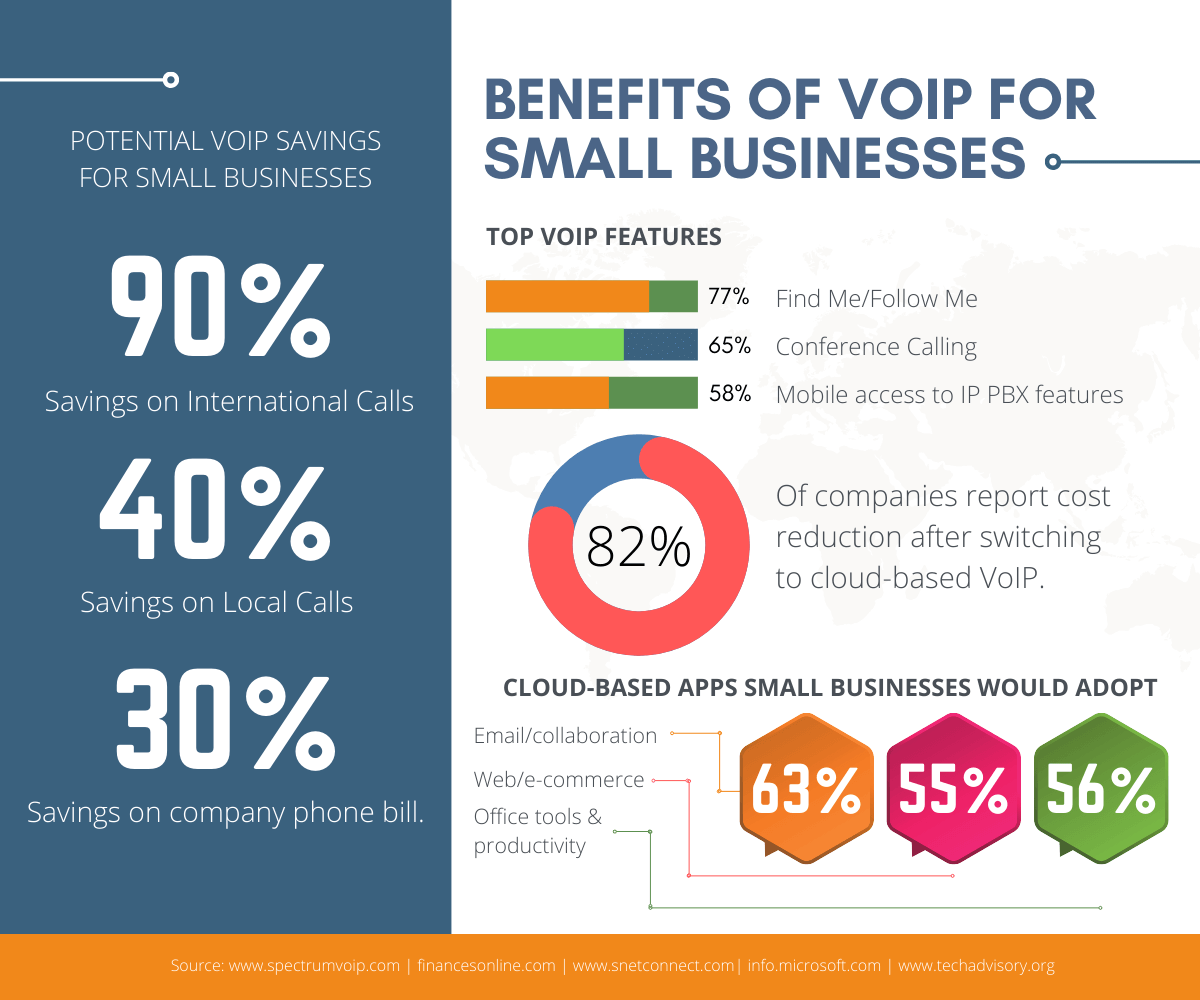Table of Contents
Enterprise VoIP refers to a communication solution commonly used by mid-sized to large corporations. Enterprise VoIP (Voice over Internet Protocol) has evolved into something more than a trend or a new technology. It is becoming more popular throughout the globe as companies realize the benefits of using it instead of traditional phone lines.
However, as is the case with any new technology, VoIP has some disadvantages. As a small company owner contemplating the implementation of VoIP in your organization, you must have a thorough grasp of both sides of the equation.
This article discusses what Enterprise VoIP is, as well as its pros and cons, to assist you in making an educated choice as you migrate to VoIP.
How Do Businesses Use VoIP?

Small and medium-sized businesses are faced with difficult decisions. They need enterprise-level IT tools, yet they are operating on a shoestring budget. Fortunately, with Enterprise VOIP, you can have your cake and eat it too.
Why? This is because VoIP technology is less expensive, simpler to deploy, and significantly less difficult to maintain than its older landline competitors.
Since it is based on the internet, voice-over IP (VOIP) has the potential to change the game. You may anticipate the growth of such capabilities in the future as the technology continues to improve and develop.
If your company is considering making the switch to an Enterprise VoIP, you should start by identifying the services you wish were available, but are missing from, your present phone system. What talents would be beneficial to the company?
Simultaneous ringing, often known as “mobile twinning,” is one of the most frequently requested services by businesses today. Most small businesses recognize the need for this feature in today’s mobile environment, and they understand the importance of being flexible and competitive.
Business VoIP, unlike traditional phone systems, provides a significant level of flexibility in terms of pricing structure. Companies can look around for the best offer that most closely meets their requirements.
For example, Enterprise VoIP service providers often allow consumers to contract for the gear in the form of a predictable monthly price rather than an upfront investment in the hardware. You may be able to lower the number of phone lines in your current phone system, depending on the type of company and how you utilize your phone system.
Aside from that, most Business VoIP providers employ “call routes” rather than the usual number of phone lines, which enables seasonal enterprises to scale up and down to keep expenditures under control.
Often, when businesses begin to investigate VoIP, they discover they are paying for lines they do not use and that these savings aid in the financial justification of adopting a new VoIP phone system.
What Kind of Businesses Use Enterprise VoIP?

VoIP technology has already gained great acceptance in a variety of businesses around the globe.
Companies in certain sectors profit more than others from the opportunity to make free internal calls among their personnel.
Any firm that makes a large number of national and international calls will reap the benefits of using Enterprise VoIP. Such calls can be costly, but a business VoIP system can drastically lower the price of these calls.
1. Customer Service
The telephone is the focal point of customer support for the vast majority of firms. When customers contact companies, they do so to resolve difficulties, troubleshoot problems, and get customized answers. All call centers may benefit from the usage of VoIP technology to minimize their operating expenses.
VoIP technology can help companies in other ways, too:
- Reduce wait times by directing calls to available agents on a predetermined schedule.
- Voicemails may be accessed using emails.
- With the aid of the live call monitoring tool, you may train your agents.
- Call data can be collected to evaluate the performance of each agent.
2. Hospitality
The use of Enterprise VoIP services makes it possible for hospitality workers to present their customers with a memorable experience. The following are some of the characteristics of a VoIP system developed for the hotel industry:
- When calling an extension, you can contact a particular department or staff member. Businesses can also add rooms to the list to make it easier to find a certain room.
- Calls are routed via an auto attendant to the appropriate department.
- “Music on hold” can be customized to keep callers riveted to the phone line. In addition, the function may be used as a marketing tool.
- To evaluate employee performance and avoid inappropriate conduct, calls can be recorded.
3. Financial Institutions
Financial experts understand how valuable money is and the large difference even small improvements can make. Enterprise VoIP for finance has the potential to bring significant advantages because of its unique qualities, which include:
- Virtual extensions so you can manage several office locations from a single location.
- Call recording and live call monitoring are excellent tools for training agents and improving call quality.
- With call recording, you may go back and review conversations to eliminate misunderstandings and noncompliance concerns.
- With virtual fax capabilities, you may send and receive faxes.
4. E-commerce
It isn’t easy to succeed in the e-commerce market. Customers expect to get their questions answered in a matter of minutes. A VoIP system may assist e-commerce enterprises in accomplishing their goals. A tailored VoIP system for an e-commerce business provides several distinct advantages, including the following:
- Calling records to check claims is a good idea.
- Mobile-friendly features that provide a seamless mobile experience are provided.
- Calls are routed via an auto attendant to a free agent.
- Incorporating customer relationship management systems allows customer care representatives to access client information on the fly, including previous sales and delivery statuses.
5. Real Estate
Every customer in the real estate industry has several options. To finalize sales, a real estate agent must give prospective buyers a positive experience throughout the buying process if they want to complete the entire sale process. VoIP systems assist real estate brokers in a variety of ways, including the following:
- Providing a cloud-based platform for staying in contact with customers and prospects.
- Providing virtual numbers that may be used for a variety of reasons, including helping tiny real estate companies to establish a reputation.
- Real estate brokers gain the ability to share photos with customers to keep the dialogue going without having to transfer to email or WhatsApp.
6. Travel Agencies
Travel agents make they’re living solely based on the quality of the service they provide to their customers. The use of a VoIP system may be a decisive element in the success of a travel agency. It provides the following capabilities:
- Text messages can be used to market services or to provide special offers to repeat customers.
- Receiving voicemails via emails allows more rapid responses to customers.
- When not at your desk, you can still forward calls to remain in contact with customers.
- Find an available agent and transfer the call as quickly as possible, while keeping customers calm with the aid of music-on-wait.
7. Healthcare
Enterprise VoIP services are standard in big hospitals, but they may also be beneficial in smaller facilities such as clinics, senior care facilities, and nursing homes. The use of wireless VoIP devices may help establish a more secure environment for communication between individuals. VoIP services for the healthcare industry include:
- The capacity to appropriately transmit calls to the proper department, or to specific physicians and nurses, is essential.
- Menus are tailored to your needs for rapid answers (press 1 for billing, press 2 for appointments, etc.).
- Reduced hold times for better patient care.
- Integration of electronic health records accesses patient information on demand.
Why Do Small Businesses Use VoIP?

The traditional phone system needed a phone switch – a closet full of real phone lines and the technology to operate them. Today, you can run your company through the internet.
For all of your company’s phone lines, you needed to employ a technical support person who could repair the switch or support hardware when things went wrong.
Not only are phone switches and their upkeep costly, but they are also sluggish and difficult to repair when something goes wrong. Your system may be down for an extended period before a professional comes to diagnose and remedy the issue – causing you to lose valuable productivity.
Some companies still maintain legacy office phone lines that are 30 to 50 years. These businesses run on concepts that were established for markets that existed in the twentieth century.
This makes it difficult to react to the demands of your company in a timely and efficient manner. Customers of conventional phone providers often express dissatisfaction with confusing or time-consuming client interfaces, as well as with the lack of integration across service offerings.
VoIP service providers are of a new generation operating under concepts based on the most up-to-date technology available. They are well-versed in web-based technologies, and they can react to changes in the market more rapidly than conventional phone providers.
It is possible to incorporate VoIP technology into systems with which you and your workers are already familiar, such as the web and mobile devices. Management portals tailored to your company’s needs give a more streamlined interface for managing your communication requirements.
VoIP is particularly well-suited to the demands of small businesses, because of its cutting-edge capabilities, user-friendly features, and improved customer service experience.
As a complement to the systems that you and your workers are currently using, VoIP systems are adaptable enough to adjust to the demands and changes of your small company. VoIP systems will improve your business communications and productivity even more as you and your employees continue to use them.
What Are Examples of VoIP?

1. Business Phone Systems
When using cloud-based business phone systems, employees can maintain a continual company presence, so they can remain connected to clients whether they are on the road or in the office.
Business phone systems are generally equipped with capabilities like instant messaging, customer relationship management software, video conferencing, and other similar functions.
2. IP Phone Systems
When establishing connections between two groups of users, IP phones make use of voice over IP (VoIP). When it comes to long-distance phone conversations, one of the primary advantages of IP phones is that you do not have to pay anything.
This phone comes with a variety of capabilities, including call recording, do not disturb, call pickup, and more.
3. Home Phone Systems
All of your phones are powered by VoIP home phone systems. This makes it possible for you to link your existing phone to the internet and keep in touch with staff located anywhere on the globe. Call routing, call forwarding, and a variety of other capabilities are essential for optimum productivity and simplified communication.
What Are the Advantages of Using VoIP?

Advantage #1: A company phone system that can be used at your workplace, on your mobile phone, and in your home.
If you use an internet connection to make and receive calls, you can free up your workers to become more mobile as the company grows.
VoIP can do this because it makes use of both hardware and software technology, which enables a phone call to be placed and delivered using Internet Protocol, also known as IP addresses.
Essentially, the program routes phone calls to your desk phone, your mobile phone, and a softphone on your laptop, among other destinations. It can send calls to all three simultaneously; whoever answers first receives the call.
The ability to answer and make calls from a business line at the office, on the road, from home, or from any other location with an internet connection becomes available to your staff.
Advantage #2: You only pay for what you use.
It will not be necessary for your friendly phone provider to come to your workplace and drill holes in the walls to install new lines. When your PCs are connected to the Internet through a network cable, your phones may simply be plugged in.
The use of applications and permissions makes it is possible to effortlessly integrate company-issued and employee-owned phones into the company’s VOIP phone network. Company administrators may easily add and remove personnel from the phone system from the comfort of their VOIP admin panel.
You can expand the number of users by adding and subtracting lines, as well as by adding and subtracting features. Internet-enabled phones do not need a significant initial investment in hardware.
Advantage #3: Lower operating costs and taxes than landlines.
Because the services are delivered through the internet, governments have traditionally had difficulty levying significant taxes on these systems to cover business phone system costs. Consider the taxes on your typical phone bill and try not to cringe when you see them. This is one of the VoIP benefits from which organizations can benefit.
Advantage #4: Personalized User Experience
The services provided by a VOIP system such as RingCentral may be customized so they are the most convenient for the users involved. Staff can, for example, choose when and where they would want their phone calls to be routed if they so choose.
Employees can, for example, customize zoom backgrounds and out-of-office warnings on their computers. Your employees may personalize their voicemail messages and plan various audio messages for different days or devices, depending on needs.
Of course, users can add planned calls to their calendars as well as meetings and video conferences with other participants. Overall, they can use the whole network’s abilities across all their devices. This has a significant positive impact on productivity.
How Do I Determine If My Business Needs a VoIP Phone System?

The decision to make the transition to voice-over-internet protocol (VOIP) is based on the quality and scale of your internet connections, workforce mobility requirements, and the savings that internet calling may provide. You should also think about your present security procedures and how much a VOIP system could affect them in the long run.
In part, because business VoIP is a quickly emerging technology, it is also being adopted at an increasing pace by businesses all over the globe. As a result, it is speculated that this technology could eventually replace POTS in the not-to-distant future. You might do well to consider making the transition. With VoIP systems, this change is easy to do because of the cheaper prices, flexibility, and wide range of services available.
For a well-informed business decision, conduct comprehensive research and consult industry experts. It’s evident that businesses aiming to stay competitive and foster growth are adopting VoIP as a valuable tool. Explore “12 AWESOME Examples of VOIP In 2023″ for further insights.




